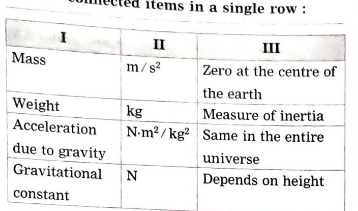Equal heat is given to two objects A and B of mass 1 g. temperature of A increases by 3∘C and B by 5∘C which object has more specific heat ? And by what factor?Solution in Marathi
The correct Answer is:53
Step by step video, text & image solution for Equal heat is given to two objects A and B of mass 1 g. temperature of A increases by 3^@C and B by 5^@C which object has more specific heat ? And by what factor? by Physics experts to help you in doubts & scoring excellent marks in Class 10 exams.
Updated on:21/07/2023Topper's Solved these Questions
Similar Questions
Give scientific reasons:
We feel that some objects are cold, and some are hot. Is this feeling related in some way to out body temperature?
View SolutionStudy the entries in the following table and rewrite them putting the connected items in a single row.

View SolutionAnswer the following questions :
At which position will you keep an object in front of a convex lens so as to get a real image of the same size as the object ? Draw a figure.
View SolutionTwo bodies A and B of equal masses are supplied with equal amountt of heat energy. If rise in temperature of A is more than that in B, what is the relation between their specific heats?
View SolutionEqual heat is given to two objects A and B of mass 1g. The temperature of A increases by 3∘C and that of B by 5∘C. Which object has more specific heat? And by what factor ?
View SolutionEqual heat is given to two objects A and B of mass 1g. Temperature of A increases by 3∘C and B by 5∘C. Which object has more specific heat? And by what factor?
View SolutionEqual heat is given to two objects A and B of mass 1g. The temperature of A increases by 3∘C and that of B by 5∘C. Which object has more specific heat? And by what factor ?
View SolutionEqual heat is given to two objects A and B of mass 1g. Temperature of A increases by 3∘C and B by 5∘C . Which object has more specific heat and by what factor ?
View SolutionEqual heat is given to two object A and B of mass 1g. Temperature of A increases by 3^(@)C and B by 5^(@)C . Which object has more specific heat ?and by what factor ?
View SolutionEqual heat is given to two objects A and B of mass 1g. Temperature of A increases by 3∘C and B by 5∘C . Which object has more specific heat and by what factor ?
View SolutionEqual heat is given to two objects X and Y of equal mass. Temperature of X increases by 6^(@)C and Y by 4.5^(@)C . Which object has more specific heat?
View SolutionEqual heat is given to two objects A and B of mass 1 g. Temperature of A increases by 3^@C and B by 5^@C . Which object has more specific heat? And by what factor?
View SolutionEqual heat is given to two objects X and Y of equal mass. Temperature of X increases by 6∘Cand Y by 4.5∘C . Which object has more specific heat? And by what factor?
View SolutionMass of object is 200g and its specific heat is 0.09 cal. g−1.∘C−1. How much that heat is required to increase its temperature from 20∘C to 90∘C?
View SolutionIf the temperature of object A is 20 °C and that of object B is 40 °C, then which object will have more heat?
View SolutionEqual heat is given to two objects A and B of mass 1 g. temperature of A increases by 3∘C and B by 5∘C which object has more specific heat ? And by what factor?
View Solution
